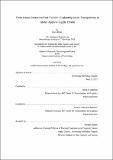From haute couture to fast-fashion : evaluating social transparency in global apparel supply chains
Author(s)
Božić, Denis, S.M. Massachusetts Institute of Technology
DownloadFull printable version (1.998Mb)
Alternative title
Evaluating social transparency in global apparel supply chains
Other Contributors
Technology and Policy Program.
Advisor
Alexis H. Bateman and Josué C. Velázquez-Martínez.
Terms of use
Metadata
Show full item recordAbstract
After Rana Plaza collapsed on April 24, 2013, in Dhaka, Bangladesh, and killed more than 1,100 workers, the apparel industry fell under widely publicized scrutiny for its negligent social practices. With consumers and non-governmental organizations aware of these issues and creating public pressure on the industry, many companies are increasingly trying to institute transparency within their supply chains to become socially sustainable. However, transparency so far has not been clearly defined, which makes the process of evaluating transparency difficult and often unpractical. The main goal of this thesis is to establish a framework and methodology that can be used by consumers, brands, and regulatory bodies to define and evaluate social transparency in global supply chains. Building on previous research in this field, we first construct a framework that distinguishes external and internal transparency, after which we identify five factors that drive supply chain transparency. Adaptive survey is then designed and used to evaluate both external and internal transparency, while investigating the role of each factor in shaping supply chain transparency. Due to time constraints and data availability, this thesis focuses primarily on external transparency and two factors: legal and political complexity and supply chain communication. Our quantitative analysis shows that the degree of external transparency increases with the size of brands, which is influenced by legal acts that focus on supply chain transparency. Additionally, our qualitative analysis shows that information asymmetry and lack of standardized auditing system have a detrimental effect on external and, ultimately, internal transparency. We therefore argue that socially responsible national legal regimes and diffusion of technological innovations are necessary to increase the degree of social transparency in global supply chains.
Description
Thesis: S.M. in Technology and Policy, Massachusetts Institute of Technology, School of Engineering, Institute for Data, Systems, and Society, Technology and Policy Program, 2017. This electronic version was submitted by the student author. The certified thesis is available in the Institute Archives and Special Collections. Cataloged from student-submitted PDF version of thesis. Includes bibliographical references (pages 134-139).
Date issued
2017Department
Massachusetts Institute of Technology. Engineering Systems Division; Massachusetts Institute of Technology. Institute for Data, Systems, and Society; Technology and Policy ProgramPublisher
Massachusetts Institute of Technology
Keywords
Institute for Data, Systems, and Society., Engineering Systems Division., Technology and Policy Program.